C Exercises: Delete node from the beginning of a doubly linked list
7. Delete from Beginning of Doubly Linked List
Write a program in C to delete a node from the beginning of a doubly linked list.
Visual Presentation:
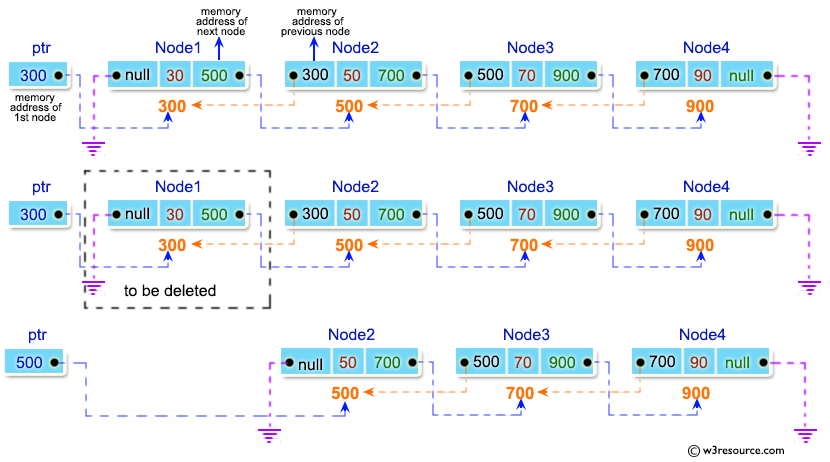
Sample Solution:
C Code:
#include <stdio.h>
#include <stdlib.h>
struct node {
int num;
struct node *preptr;
struct node *nextptr;
} *stnode, *ennode;
// Function prototypes
void DlListcreation(int n);
void DlListDeleteFirstNode();
void displayDlList(int a);
int main() {
int n, a;
stnode = NULL;
ennode = NULL;
// User input for the number of nodes
printf("\n\n Doubly Linked List : Delete node from the beginning of a doubly linked list :\n");
printf("----------------------------------------------------------------------------------\n");
printf(" Input the number of nodes (3 or more ): ");
scanf("%d", &n);
// Creating the doubly linked list
DlListcreation(n);
a = 1;
displayDlList(a);
// Deleting the first node from the doubly linked list
DlListDeleteFirstNode();
a = 2;
displayDlList(a);
return 0;
}
// Function to create a doubly linked list
void DlListcreation(int n) {
int i, num;
struct node *fnNode;
if (n >= 1) {
// Allocating memory for the first node
stnode = (struct node *)malloc(sizeof(struct node));
if (stnode != NULL) {
// Input data for the first node
printf(" Input data for node 1 : ");
scanf("%d", &num);
stnode->num = num;
stnode->preptr = NULL;
stnode->nextptr = NULL;
ennode = stnode;
// Loop to create subsequent nodes and link them
for (i = 2; i <= n; i++) {
fnNode = (struct node *)malloc(sizeof(struct node));
if (fnNode != NULL) {
printf(" Input data for node %d : ", i);
scanf("%d", &num);
fnNode->num = num;
fnNode->preptr = ennode; // Linking new node with the previous node
fnNode->nextptr = NULL; // Setting next address of fnNode as NULL
ennode->nextptr = fnNode; // Linking previous node with the new node
ennode = fnNode; // Assigning new node as last node
} else {
printf(" Memory can not be allocated.");
break;
}
}
} else {
printf(" Memory can not be allocated.");
}
}
}
// Function to delete the first node from the doubly linked list
void DlListDeleteFirstNode() {
struct node *NodeToDel;
if (stnode == NULL) {
printf(" Delete is not possible. No data in the list.\n");
} else {
NodeToDel = stnode;
stnode = stnode->nextptr; // Move the next address of starting node to the second node
if (stnode != NULL) {
stnode->preptr = NULL; // Set previous address of starting node as NULL
}
free(NodeToDel); // Delete the first node from memory
}
}
// Function to display the doubly linked list
void displayDlList(int m) {
struct node *tmp;
int n = 1;
if (stnode == NULL) {
printf(" No data found in the List yet.");
} else {
tmp = stnode;
if (m == 1) {
printf("\n Data entered in the list are :\n");
} else {
printf("\n After deletion the new list are :\n");
}
// Loop to display nodes and their data
while (tmp != NULL) {
printf(" node %d : %d\n", n, tmp->num);
n++;
tmp = tmp->nextptr; // Moving the current pointer to the next node
}
}
}
Sample Output:
Doubly Linked List : Delete node from the beginning of a doubly linked list :
----------------------------------------------------------------------------------
Input the number of nodes (3 or more ): 3
Input data for node 1 : 1
Input data for node 2 : 2
Input data for node 3 : 3
Data entered in the list are :
node 1 : 1
node 2 : 2
node 3 : 3
After deletion the new list are :
node 1 : 2
node 2 : 3
Flowchart:
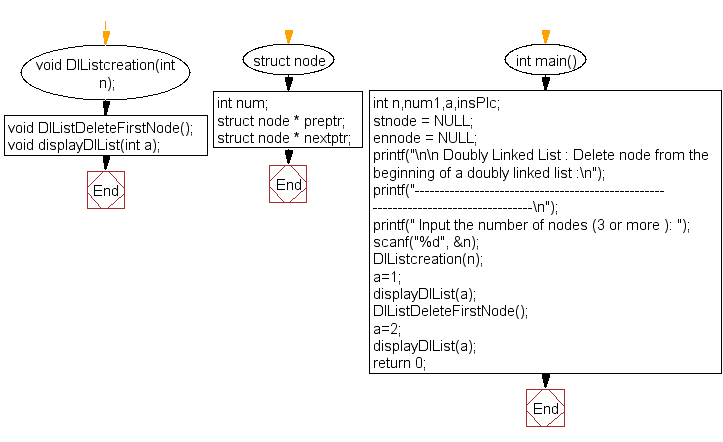
DlListcreation() :
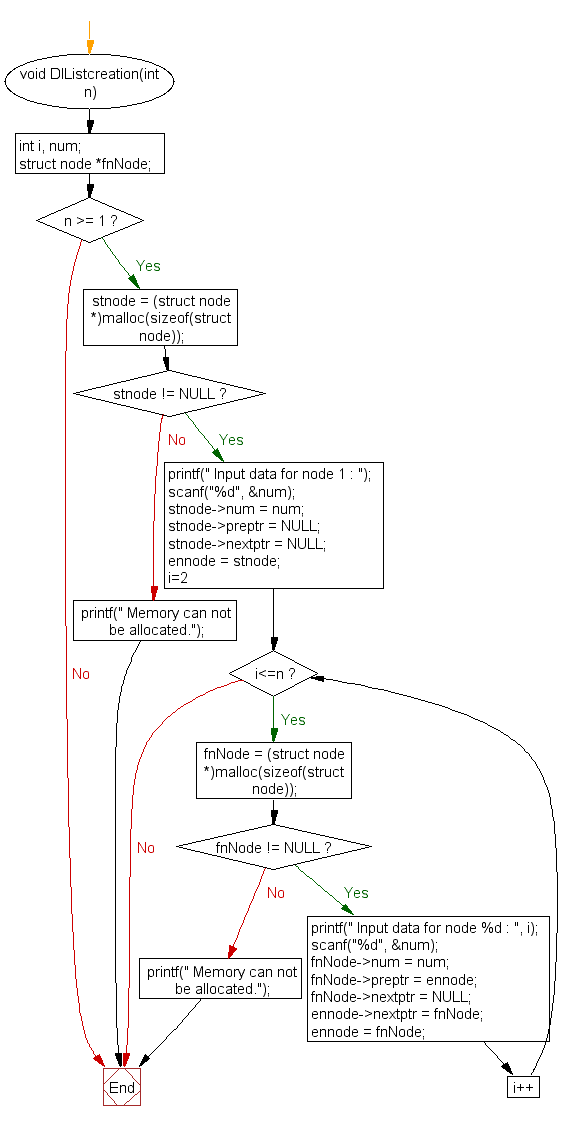
DlListDeleteFirstNode() :
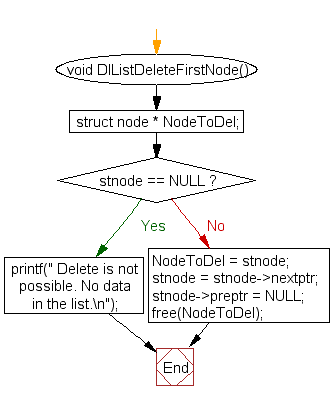
displayDlList() :
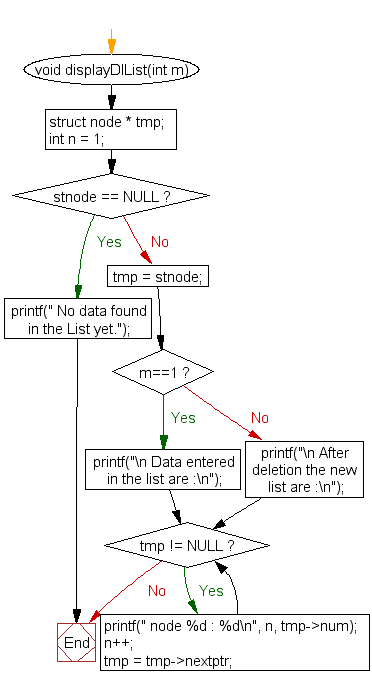
For more Practice: Solve these Related Problems:
- Write a C program to delete the first node of a doubly linked list and return its value to the user.
- Write a C program to remove the head node of a doubly linked list only if it satisfies a specified condition (e.g., is even).
- Write a C program to delete the first node of a doubly linked list using a recursive deletion strategy.
- Write a C program to delete the head node of a doubly linked list and properly free its allocated memory.
Go to:
PREV : Insert in the Middle of Doubly Linked List.
NEXT : Delete from End of Doubly Linked List.
C Programming Code Editor:
Have another way to solve this solution? Contribute your code (and comments) through Disqus.
What is the difficulty level of this exercise?
Test your Programming skills with w3resource's quiz.
